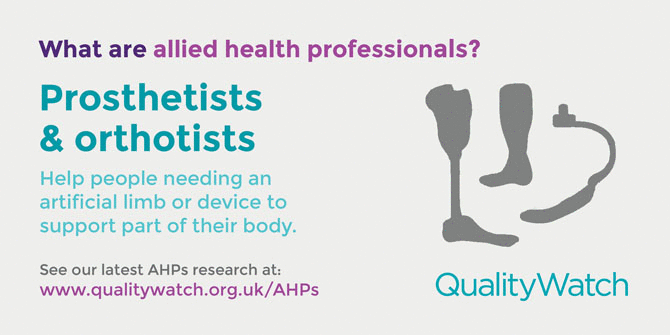The NHS has over 64,000 allied health professionals (AHPs) on its books – up by a third in the last decade. They outnumber GPs, and account for a £2bn salary bill each year. Yet we hear surprisingly little about them.
Hidden, overlooked or undervalued
We have just published a report looking at what we know about the quality of care provided by this diverse group, who include speech therapists, physiotherapists and paramedics. Our research found that their contribution to care is often hidden, overlooked or potentially undervalued.
There is little systematic information available at a national level about the quality of care AHPs deliver – an anomaly in an age of ever more inspections, targets and comparison websites for other branches of the health service. We simply need more data and information to understand the care AHPs are delivering, how good it is and how it can improve.
For example, unlike with GPs and hospital services, the NHS does not survey patients about whether they have the access to AHPs they need, or whether their experiences have been good.
Supporting a more integrated service
We live in a period where the NHS and social care face many challenges. Money is tight, pressures are increasing and things are only going to get worse. The trends of an ageing population, and people developing more complex needs, look set to continue indefinitely. Tackling these requires moving to a more integrated service even as tough savings are made.
Are allied health professionals part of the solution? You may not know them by that name, but most people have received care from an AHP at some time. As a group they include 12 different professions:

Together, their remit is diverse and far-reaching. But supporting people to manage long-term conditions or chronic health problems is at the core of most of their work.
Integrated care is part and parcel of most AHP services – they work across many care settings, with a whole range of other health professionals. Many of them also deliver a large proportion of care to older people and those with more complex conditions. As a group, this makes them well placed to shape the integrated care agenda, making care more coordinated and person-centred. We can learn lessons from AHPs in particular the way roles and responsibilities can evolve to be more integrated.
An expanding skill set
Beyond integration, AHPs are further expanding their skill set. In the past few years we’ve seen physiotherapists and chiropodists/podiatrists become independent prescribers. There is also a focus on self-referral to many AHP services. Both of these expanded roles promote flexibility, providing benefits for the patients they treat.
It is hoped that by being able to prescribe, AHPs will increase capacity across the system and save the time and money of involving other healthcare professionals. Stretched NHS finances and busy patients both win when a GP appointment isn’t needed to get a referral to see a chiropodist, or to get pain medication which could be prescribed by a physiotherapist.
We need better data
While the key benefits of promoting AHP services are recognised by some, there are still big problems. The biggest is the lack of consistent, national information about the contribution that AHPs make: the limited data we do have only cover small parts of care delivered in hospitals.
Our report includes ways to change this. Demanding more data is rarely a cause that brings boots onto the streets. But knowing whether care is good and how it can get better should matter to anyone who values or relies on our squeezed NHS.
